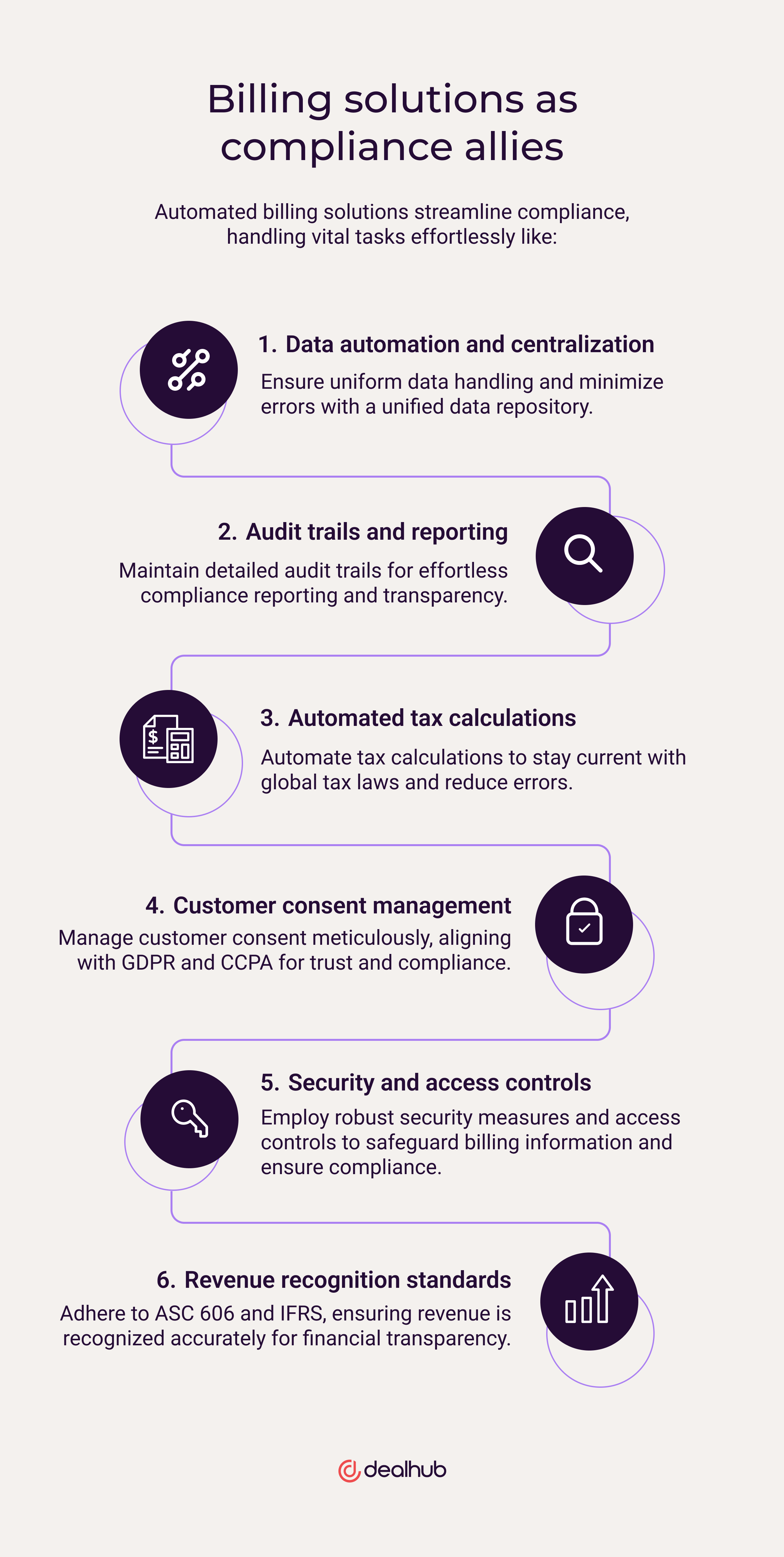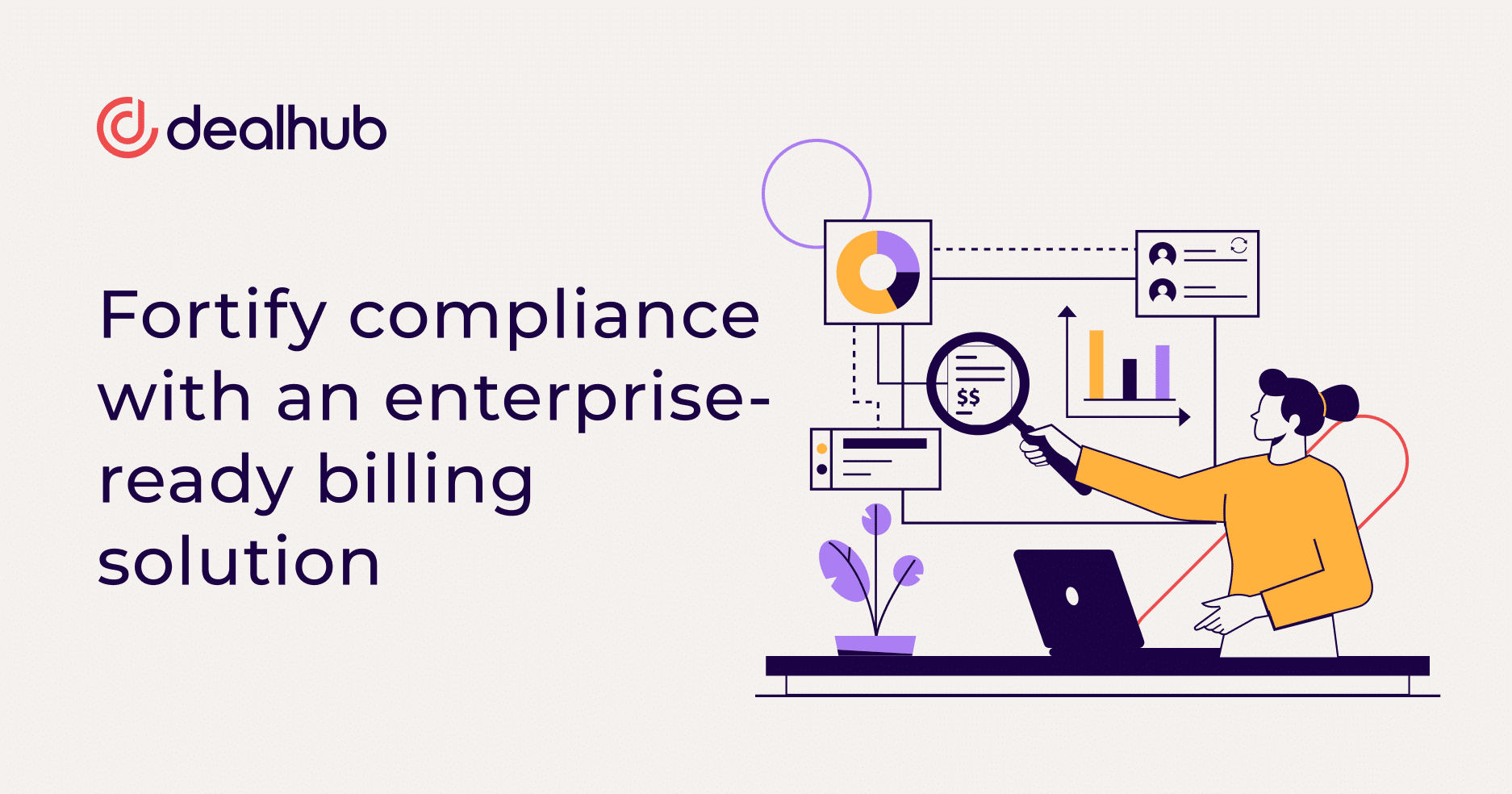Extensive data protection laws, such as the General Data Protection Regulation (GDPR) and the California Consumer Privacy Act (CCPA), are leading the regulatory challenges. These regulations impose strict guidelines on data handling, impacting billing processes that often involve sensitive customer information. Furthermore, businesses must navigate a labyrinth of tax laws, which vary not only between countries but often between regions within countries. The complexity multiplies for companies operating globally, where compliance with local tax laws becomes arduous.
Billing solutions have become indispensable in ensuring adherence to regulations, evolving from transactional tools to sophisticated platforms that manage compliance requirements. They have become necessary for compliance as they automate and standardize billing processes, which helps businesses comply with different regulatory demands. As the world becomes more globalized, these solutions adjust to support various tax structures, legal requirements, and financial reporting standards. This flexibility is needed to ensure that businesses stay compliant with the law.
In this environment, billing solutions facilitate transactions and act as guardians of compliance, ensuring that every invoice, receipt, and financial record adheres to the latest legal standards. Read on to learn about the importance of these solutions in ensuring regulatory compliance and their role in keeping businesses in line with changing legal requirements.
The compliance challenge
For multinational corporations, compliance is a jigsaw puzzle with constantly shifting pieces. Operating across multiple jurisdictions, these entities face the daunting task of keeping up with a kaleidoscope of regulatory frameworks. Each region presents its unique set of rules, from tax codes to data protection laws, which can make compliance requirements quite complex.
The dynamic nature of regulations further compounds this complexity. Laws like GDPR and CCPA are not static; they evolve in response to the changing digital landscape, political climate, and public sentiment. Keeping up with these changes demands vigilance and agility in adapting business processes accordingly. The challenge lies not only in understanding these regulations but also in embedding their requirements into a business’s daily operations.
And the stakes of non-compliance are toweringly high. Financial penalties for breaches can be astronomical, as seen in multi-million dollar fines levied under GDPR. However, the impact extends beyond financial loss. Non-compliance can tarnish a company’s reputation, eroding customer trust and investor confidence. In an era where brand image is intricately tied to ethical operation, such fallout can be more crippling than the fines themselves.
Given these repercussions, a proactive approach to billing compliance is not a luxury but a necessity for long-term sustainability. It’s about building a compliance-first culture, where regulatory adherence is ingrained in every business decision and process. This approach involves understanding current laws and anticipating future changes, ensuring that the company is always a step ahead in the compliance game.
Proactive compliance strategies enable businesses to navigate the regulatory labyrinth with confidence. They transform compliance from a reactive, box-ticking exercise into a strategic advantage, fostering an environment where business growth and legal adherence go hand in hand.
Billing solutions as compliance allies

Automated billing solutions streamline compliance, handling vital tasks like tax calculations and revenue recognition effortlessly. This simplification saves time and resources, ensuring businesses easily meet regulatory requirements. They do this with capabilities such as data centralization, audit trails, automated tax calculations, and consent management.
Data automation and centralization
In regulatory compliance, consistency is king. Billing solutions offer this through data automation and centralization, creating a unified repository for all billing-related data. This centralization ensures that every piece of data, from customer details to transaction records, is handled uniformly. Automated data processing minimizes human error, ensuring that each entry meets the latest compliance standards. This seamless handling is essential in meeting the stringent demands of various regulations, offering a solid foundation for compliance.
Audit trails and reporting
Billing solutions act as meticulous record-keepers, maintaining comprehensive audit trails. Every transaction, amendment, and access to billing data is logged and time-stamped. This level of detail is invaluable during compliance audits, allowing businesses to easily demonstrate their adherence to regulatory standards. Detailed reporting capabilities mean that generating compliance reports, a task once fraught with complexity, becomes streamlined and efficient. These features ensure transparency and accountability, crucial in regulatory compliance.
Automated tax calculations
Tax laws are notorious for their complexity and tendency to change. Billing solutions address this challenge by automating tax calculations. They are equipped to handle various tax rates and rules, adjusting automatically as legislation evolves. This capability eliminates the risk of human error in tax calculations, ensuring that invoices and financial records always comply with the latest tax laws. This feature is a lifeline for businesses operating internationally in managing the intricacies of global tax compliance.
Customer consent management
With regulations like GDPR and CCPA spotlighting data privacy, managing customer consent has become crucial to compliance. Billing solutions are instrumental in this regard. They provide mechanisms for tracking and documenting customer consent for data usage, ensuring that billing processes align with legal requirements. This functionality is not just about compliance; it fosters trust, assuring customers that their data is handled responsibly.
Security and access controls
Data security is a keystone of regulatory compliance, particularly for billing information, which often contains sensitive data. Billing solutions reinforce compliance by implementing robust security measures and access controls. These systems ensure that sensitive data is protected from unauthorized access and breaches, aligning with regulations that mandate strict data security protocols. Effective security and access controls are more than a defense mechanism; they’re a compliance requisite (SOC).
Revenue recognition standards
Billing solutions also address compliance with revenue recognition standards such as ASC 606 and IFRS. These standards dictate how and when revenue is recognized in the financial statements, a critical aspect of financial transparency and compliance. Billing solutions help businesses conform to these standards by correctly allocating revenue and providing detailed financial reporting. This adherence is vital for compliance and providing stakeholders with an accurate picture of the company’s financial health.
Benefits of leveraging billing solutions
Billing solutions provide a reliable way to navigate regulatory compliance. Their most immediate benefit is a significant reduction in non-compliance risks. By automating and standardizing compliance processes, these solutions diminish the likelihood of errors that could lead to costly penalties and legal repercussions. This protective shield safeguards finances and fortifies a company’s legal standing.
Billing solutions also substantially boost operational efficiency. These systems free up valuable resources by automating routine tasks and streamlining complex processes. This efficiency translates into cost reductions, as less time and manpower are required to manage billing and compliance tasks. Moreover, the precision of automated systems means fewer errors and less time spent correcting them, optimizing resource allocation further.
Furthermore, transparency and auditability are enhanced immeasurably through billing solutions. With comprehensive record-keeping and reporting functionalities, stakeholders can easily access and scrutinize financial records. This transparency is not just a compliance asset; it also strengthens investor and stakeholder confidence, showcasing a company’s commitment to ethical practices and sound financial management.
Perhaps the most profound benefit lies in earning customer trust. In an era where data privacy is paramount, responsible data management is a critical determinant of customer trust. Billing solutions are pivotal in managing customer data responsibly and transparently, aligning with stringent privacy laws. This responsible handling of sensitive information fosters customer confidence, a valuable commodity in today’s market where trust is as significant as the quality of products or services offered.
Fortify your billing compliance
In the quest for regulatory adherence, selecting and implementing an effective billing solution is a critical step. The key is choosing a system that aligns with your current compliance needs and is scalable and adaptable to future regulatory changes. Look for solutions with robust data automation, security features, and a track record of adapting to legislative shifts. Implementation should be approached methodically, ensuring that all aspects of the billing process are aligned with regulatory requirements and that staff are trained to leverage the system effectively.
However, deploying a billing solution is not a set-and-forget affair. Continuous monitoring and regular updates are essential to stay in lockstep with evolving regulations. This proactive stance involves staying informed about legal changes, regularly assessing the system’s efficacy, and making necessary adjustments. Such vigilance ensures that your billing processes remain compliant and effective over time.
These solutions offer a multifaceted approach to compliance, reducing risks of non-compliance, enhancing operational efficiency, and fostering transparency and trust among stakeholders. They serve not just as tools for transaction management, but as guardians of compliance and enablers of business integrity.
Given the regulations in place, upgrading to a robust and agile billing solution like DealHub Billing is a strategic priority. Leaders, assess your current billing system in light of these evolving challenges. Are you equipped to handle the intricacies of global compliance and data security? If not, now is the time to act. Investing in advanced billing solutions is not merely about adapting; it’s about positioning your business for success and resilience in an increasingly competitive and regulated world. Take the step today to transform your billing process and secure your business’s future.




